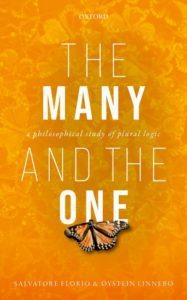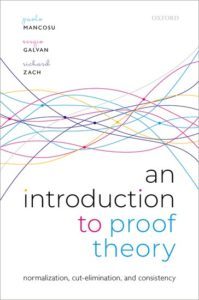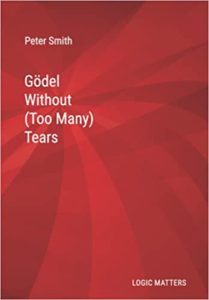Peter Smith's Blog, page 44
June 29, 2021
More forthcoming logical treats
 Two more books forthcoming from OUP that I am also really looking forward to seeing. First, there is Salvatore Florio and Øystein Linnebo’s The One and The Many: A Philosophical Study of Plural Logic. Since the ground-breaking work of my one-time colleagues Alex Oliver and Timothy Smiley, starting over twenty years ago, I’ve found this an intriguing topic. And I’m fully persuaded, for example, that low-level plural talk can do much of the work we conventionally use low-level set talk for, in an ontologically innocent way. But Alex and Timothy in the end push things a great deal further (both with e.g. what strike me as inelegant formal complications, and with over-ambitious claims about how far we can replace set theory with a theory of plurals). I’ll be very interested to see what Florio and Linnebo have to say in assessing the state-of-play in work on plural logic, and in their own philosophical discussions. Credit to OUP again: this book will be published as a pricey hardback but also as free open-access online.
Two more books forthcoming from OUP that I am also really looking forward to seeing. First, there is Salvatore Florio and Øystein Linnebo’s The One and The Many: A Philosophical Study of Plural Logic. Since the ground-breaking work of my one-time colleagues Alex Oliver and Timothy Smiley, starting over twenty years ago, I’ve found this an intriguing topic. And I’m fully persuaded, for example, that low-level plural talk can do much of the work we conventionally use low-level set talk for, in an ontologically innocent way. But Alex and Timothy in the end push things a great deal further (both with e.g. what strike me as inelegant formal complications, and with over-ambitious claims about how far we can replace set theory with a theory of plurals). I’ll be very interested to see what Florio and Linnebo have to say in assessing the state-of-play in work on plural logic, and in their own philosophical discussions. Credit to OUP again: this book will be published as a pricey hardback but also as free open-access online.
 Back in the day, I was for a while interested in the vexed topic of the sorites paradox and formal theories of vagueness. One of the most thought-provoking writers on vagueness at that time was Crispin Wright, and he has continued to revisit the topic repeatedly over the years. He is now collecting together fourteen papers written over nearly fifty years, with a long expository introduction by Richard Heck, as The Riddle of Vagueness (again OUP). I confess I never reached a settled view of what would count as a satisfying answer to the puzzlement about vagueness that I had, and in particular I was (and am) unclear exactly what a formal theory (supervaluationist, intuitionist, degree theory, whatever) is supposed to buy us. Having not thought about all this for a good while, I’m looking forward to revisiting Wright’s earlier papers and reading some of his later work on the topic.
Back in the day, I was for a while interested in the vexed topic of the sorites paradox and formal theories of vagueness. One of the most thought-provoking writers on vagueness at that time was Crispin Wright, and he has continued to revisit the topic repeatedly over the years. He is now collecting together fourteen papers written over nearly fifty years, with a long expository introduction by Richard Heck, as The Riddle of Vagueness (again OUP). I confess I never reached a settled view of what would count as a satisfying answer to the puzzlement about vagueness that I had, and in particular I was (and am) unclear exactly what a formal theory (supervaluationist, intuitionist, degree theory, whatever) is supposed to buy us. Having not thought about all this for a good while, I’m looking forward to revisiting Wright’s earlier papers and reading some of his later work on the topic.
A hardback version of Gödel Without (Too Many) Tears became available a couple of weeks ago (to add to the freely-downloadable PDF and the very cheap paperback). Aimed very much at libraries — because librarians turn up their noses as Am*z*n-only self-published paperbacks — I hadn’t the foggiest idea how many copies a hardback would sell, or whether I’d recoup the modest set-up costs (including e.g. buying “proper” ISBN numbers attributed to Logic Matters as an official imprint).
Well, Ingramspark (who do the distribution of print-on-demand hardback copies to booksellers) report almost 60 sales. So I won’t end up out of pocket. I haven’t yet had my own ordered copy; so my fingers are still crossed that the hardback looks as good as the paperback. But assuming I’m happy with the copy when it arrives, that encourages me to similarly arrange for hardback library versions of An Introduction to Formal Logic and of An Introduction to Gödel’s Theorems. Watch for an announcement.
As I said a couple of posts back, I badly need to update this website. But it is becoming clear, looking at the under-the-bonnet tangle, that I really need to rebuild the site from the ground up, starting with a blank canvas and transferring across what’s worth keeping, editing as I go. That will appeal to my nerdy side, but will no doubt take quite a while. In the meantime, then, my apologies that pages on this old site are often loading very slowly. Though a couple of minor tweaks yesterday should have improved things slightly.
June 28, 2021
Forthcoming book: An Introduction to Proof Theory
 The next chapter of my Beginning Mathematical Logic: A Study Guide is announced as covering proof theory. I’ve been quietly bemoaning the fact that there hasn’t been a good, well-written, up-to-date introduction that can readily be recommended as a teach-yourself book at the right sort of level. So I thought I was going to have to put together a rather complicated set of suggestions (“read this chapter from this book, then look at those excerpts from that book, and follow this up with some of that other book”), and that would require a lot of homework — especially as I was finding that my memories of what is covered where are pretty fallible.
The next chapter of my Beginning Mathematical Logic: A Study Guide is announced as covering proof theory. I’ve been quietly bemoaning the fact that there hasn’t been a good, well-written, up-to-date introduction that can readily be recommended as a teach-yourself book at the right sort of level. So I thought I was going to have to put together a rather complicated set of suggestions (“read this chapter from this book, then look at those excerpts from that book, and follow this up with some of that other book”), and that would require a lot of homework — especially as I was finding that my memories of what is covered where are pretty fallible.
So I’m just delighted to discover by accident that there is book forthcoming for OUP next month from Paolo Mancosu, Sergio Galvan, and Richard Zach with the very promising title An Introduction to Proof Theory: Normalization, Cut-Elimination, and Consistency Proofs. How did I miss that before? Here’s the blurb:
An Introduction to Proof Theory provides an accessible introduction to the theory of proofs, with details of proofs worked out and examples and exercises to aid the reader’s understanding. It also serves as a companion to reading the original pathbreaking articles by Gerhard Gentzen. The first half covers topics in structural proof theory, including the Gödel-Gentzen translation of classical into intuitionistic logic (and arithmetic), natural deduction and the normalization theorems (for both NJ and NK), the sequent calculus, including cut-elimination and mid-sequent theorems, and various applications of these results. The second half examines ordinal proof theory, specifically Gentzen’s consistency proof for first-order Peano Arithmetic. The theory of ordinal notations and other elements of ordinal theory are developed from scratch, and no knowledge of set theory is presumed. The proof methods needed to establish proof-theoretic results, especially proof by induction, are introduced in stages throughout the text. Mancosu, Galvan, and Zach’s introduction will provide a solid foundation for those looking to understand this central area of mathematical logic and the philosophy of mathematics.
Surely, especially given these authors, exactly what we need! There are a few more details here. I really look forward to reading this. And a bonus point to OUP, by the way, for bringing out this 432 page paperback for a very reasonable price.
June 26, 2021
Pavel Haas Quartet and Boris Giltburg, video recording for the Library of Congress
 Now available: wonderful new video performances recorded at the Suk Hall in Prague, of Smetana’s String Quartet no. 2 in D minor, Bartók’s String Quartet no. 4, and Brahms, Piano Quintet in F minor, op. 34. The Brahms in particular was a revelation to me — with Boris Giltburg’s playing quite magical. (He is also responsible for some striking photos of the quartet’s new line-up.)
Now available: wonderful new video performances recorded at the Suk Hall in Prague, of Smetana’s String Quartet no. 2 in D minor, Bartók’s String Quartet no. 4, and Brahms, Piano Quintet in F minor, op. 34. The Brahms in particular was a revelation to me — with Boris Giltburg’s playing quite magical. (He is also responsible for some striking photos of the quartet’s new line-up.)
The PHQ sounding so good too with their very impressive new violist Luosha Fang. It is difficult indeed to believe that they had been rehearsing together only a few weeks when this was filmed. A whole series of live concerts are now announced on their updated website though mostly in the Czech Republic or nearby. But there are two more forthcoming online performances scheduled soon, about which more in a later post.
The post Pavel Haas Quartet and Boris Giltburg, video recording for the Library of Congress appeared first on Logic Matters.
June 25, 2021
Website woes (updated again)
For a day, all the comments here on blog posts and on static pages oddly disappeared. But by magic they have now reappeared. By magic, because I spent a couple of hours online with Bluehost without resolving the problem. (I can’t be too cross about that, apart from the annoying waste of time — Bluehost have been absolutely stars at sorting issues in the past). And now, in some random fiddling on seemingly unrelated aspects of the site, the comments have reappeared. Hey ho.
But still, maybe this is all telling me that — after more than ten years — it is really well past time to update the WordPress theme, and do various other under-the-bonnet updates. I’ve been putting this off for too long. Bluehost have set things up so I can play with a test site for a while before going live. So there’s a project for rainy evenings …
The post Website woes (updated again) appeared first on Logic Matters.
Beginning Mathematical Logic: A Study Guide
I’ve renamed the old Teach Yourself Logic study guide; it is now more aptly called Beginning Mathematical Logic: A Study Guide. And there is now a new version of Part I of the Guide (all 95 pages of it) which you can download from here.
If you read the PDF from within a browser it seems best to use Firefox on a Mac (as then, if you go back after clicking a link, you are returned to your place in the Guide: Safari returns you unhelpfully to the beginning of the Guide).
All comments/corrections gratefully received as always — but perhaps best by email until I can sort out the comment handling on the blog.
The post Beginning Mathematical Logic: A Study Guide appeared first on Logic Matters.
Website woes ….
I think because of a WordPress update, comments are suddenly no longer displaying in a computer browser. They haven’t vanished into the ether as they are still available on the admin dashboard, and oddly they are still displaying on my iPhone.
I’ll try to sort this. But pages sometimes seem to be uploading slowly too. So maybe this is all telling me that — after more than ten years — it is really past time to update the WordPress theme, to sort out the plugins, and do various other under-the-bonnet updates. I’ve been putting it off for too long.
The post Website woes …. appeared first on Logic Matters.
June 14, 2021
New look, new hardback
 The three Big Red Logic Books have a new look. I’m staying with the red theme, but no longer using the free Amazon KDP online cover-builder which produced their rather muddy colour and muddy swirls. The outsides, then, are a bit less dull. I’m afraid the insides of the paperbacks stay just the same!
The three Big Red Logic Books have a new look. I’m staying with the red theme, but no longer using the free Amazon KDP online cover-builder which produced their rather muddy colour and muddy swirls. The outsides, then, are a bit less dull. I’m afraid the insides of the paperbacks stay just the same!
More importantly, perhaps, a hardback of Gödel Without (Too Many) Tears is published today. It is currently available from e.g. Barnes and Noble (in the US), Gardners (the UK library book suppliers), Booktopia (in Oz), as well as the local Amazons. I hope it will soon propagate to other sellers like Blackwells. It won’t just appear on bookshop shelves, however: you’ll have to order it.
I’m not really expecting anyone reading this blog to buy it for themselves! However, you might like to recommend the hardback to your local friendly university or college librarian. Some librarians are pretty resistant to buying from Amazon (especially self-published paperbacks). That’s why I’m experimenting with hardback publication. We are going a step up here, using the same print-on-demand providers now used e.g. by CUP for some of their books, with a “proper” ISBN officially assigned to the Logic Matters imprint. It is still pretty cheap as academic hardbacks go — £14 in the UK and comparable prices elsewhere (so this isn’t going to make my fortune: to be honest, I’ll be pretty surprised if I even recoup the set-up costs.)
Of course the PDF version is still freely available, and I’ve kept the paperback version as Amazon-only as that absolutely minimizes the price to students. But I like to think that the book should be available on the shelves in university libraries, so please take a moment to recommend the hardback! Its ISBN is 978-1916906303.
(Apologies by the way to readers down under that the paperback is still not locally printed and hence not cheaply available to you: Amazon say they are working on being able to produce paperbacks in the relevant format “soon” …)
Update: At the moment Amazon UK are giving a very long delivery date for the hardback, but I hope that’s temporary. Amazon US by contrast are giving a very short delivery date.
The post New look, new hardback appeared first on Logic Matters.
New look, new hardback
 The three Big Red Logic Books have a new look. I’m staying with the red theme, but no longer using the free Amazon KDP online cover-builder which produced their rather muddy colour and muddy swirls. Less dull outsides then; but I’m afraid the insides of the paperbacks stay just the same!
The three Big Red Logic Books have a new look. I’m staying with the red theme, but no longer using the free Amazon KDP online cover-builder which produced their rather muddy colour and muddy swirls. Less dull outsides then; but I’m afraid the insides of the paperbacks stay just the same!
More importantly, perhaps, a trial hardback of Gödel Without (Too Many) Tears is published tomorrow. It is currently available from e.g. Barnes and Noble (in the US), Gardners (the UK library book suppliers), Booktopia (in Oz), as well as the local Amazons. I hope it will soon propagate to other sellers like Blackwells. It won’t just appear on bookshop shelves, however: you’ll have to order it.
I’m not really expecting anyone reading this blog to buy it for themselves! However, you might like to recommend the hardback to your local friendly university or college librarian. Some librarians are pretty resistant to buying from Amazon (especially self-published paperbacks). So we are going a step up here, using the same print-on-demand providers now used e.g. by CUP for some of their books, with a “proper” ISBN officially assigned to the Logic Matters imprint. It is still pretty cheap as academic hardbacks go — £14 in the UK and comparable prices elsewhere (so this isn’t going to make my fortune: to be honest, I’ll be pretty surprised if I even recoup the set-up costs.)
Of course the PDF version is still freely available, and I’ve kept the paperback version as Amazon-only as that absolutely minimizes the price to students. But I like to think that the book should be available on the shelves in university libraries, so please take a moment to recommend the hardback! Its ISBN is 978-1916906303.
(Apologies by the way to readers down under that the paperback is still not locally printed and hence not cheaply available to you: Amazon say they are working on being able to produce paperbacks in the relevant format “soon” …)
The post New look, new hardback appeared first on Logic Matters.
June 7, 2021
Distractions
 A number of distractions (good distractions!) from logical writing projects recently. For a start, we spent some days near the Suffolk coast, a few miles inland from Aldeburgh. The first time we’ve stayed away from Cambridge in these days of Covid. Initially, we were quite irrationally tentative about doing that — but this seems a quite common reaction after more than a year of restrictions. But we had a great time. The weather was good enough for lots of breezy walks. And being by the sea always very much lifts the spirits.
A number of distractions (good distractions!) from logical writing projects recently. For a start, we spent some days near the Suffolk coast, a few miles inland from Aldeburgh. The first time we’ve stayed away from Cambridge in these days of Covid. Initially, we were quite irrationally tentative about doing that — but this seems a quite common reaction after more than a year of restrictions. But we had a great time. The weather was good enough for lots of breezy walks. And being by the sea always very much lifts the spirits.
Back home to hours of nerdy amusement for me, playing around with a new bit of serious software, Affinity Publisher. Extraordinarily inexpensive but powerful alternative to Adobe InDesign. Lots of terrific reviews, and certainly seems quite excellent to me. Have used it to design good-enough covers — still big and red but slightly snappier — for hardback versions of the Big Red Logic Books, and I’ll use the same redesign for the republished paperbacks. More about this when the first hardbacks become available, shortly I hope.
Not least among the distractions, my new 24″ iMac has arrived. Entry-level in blue, since you asked.
Took a day to clear my study into a fit state to have somewhere to put it, and half another day to set it up, transferring files across, installing software and so on. But I’m bowled over by the result.
I’ve not had a desktop machine for well over a decade. So the difference between this and my trusty (but soon-to-be-traded-in) six year old MacBook Pro is wonderful. The big screen in particular is amazing. For LaTeX, being able to work with source code and PDF output side-by-side in big windows is a delight. And LaTeX compiles a large diagram-heavy file about 2.5 times faster too, which is a nice bonus.
The iMac itself is a thing of beauty (significantly better in reality, I’d say, than in the adverts). Even Mrs Logic Matters is impressed. The front-side colour is pleasingly muted. And those “white bezels” which Mac forums were complaining about a lot when the machine was launched in fact strike me as something of a design triumph. They aren’t glaring white — but a sort of slighty-grey off-white and so, in use, the edges of the screen shade off in your peripheral vision into your background wall (at least, if your background wall is fairly neutral like my study wall), in a way which works very well. I could go on. But if you were wavering about whether to get one, I’d say just do it!
The post Distractions appeared first on Logic Matters.
June 6, 2021
Mitsuko Uchida plays the Schubert Impromptus
 The wonderful Mitsuko Uchida played the two sets of Schubert Impromptus at Wigmore Hall a few nights ago. You can catch the Radio 3 broadcast here. There is also a video recording on Wigmore Hall’s site, and on Youtube. Such extraordinary playing of such great music.
The wonderful Mitsuko Uchida played the two sets of Schubert Impromptus at Wigmore Hall a few nights ago. You can catch the Radio 3 broadcast here. There is also a video recording on Wigmore Hall’s site, and on Youtube. Such extraordinary playing of such great music.
The post Mitsuko Uchida plays the Schubert Impromptus appeared first on Logic Matters.



